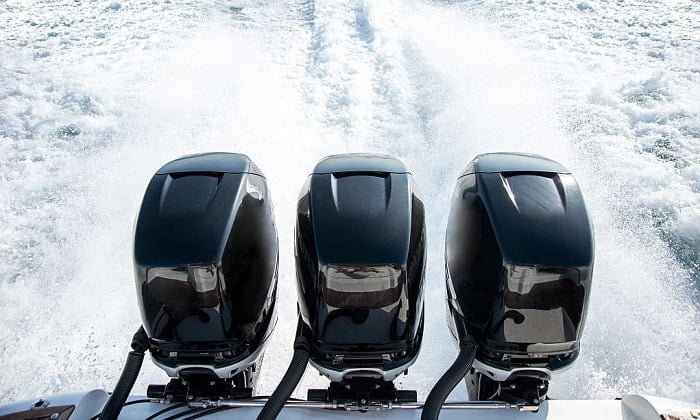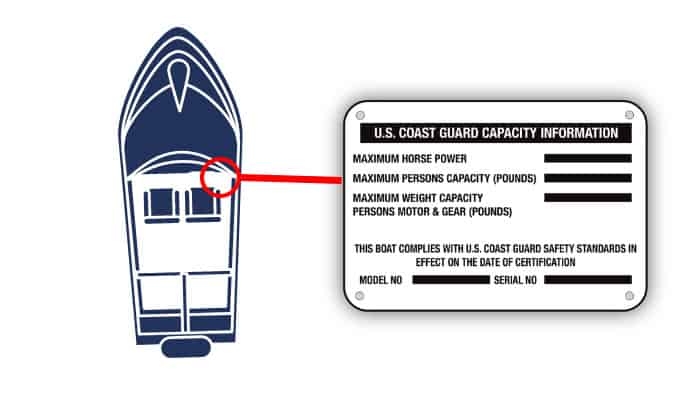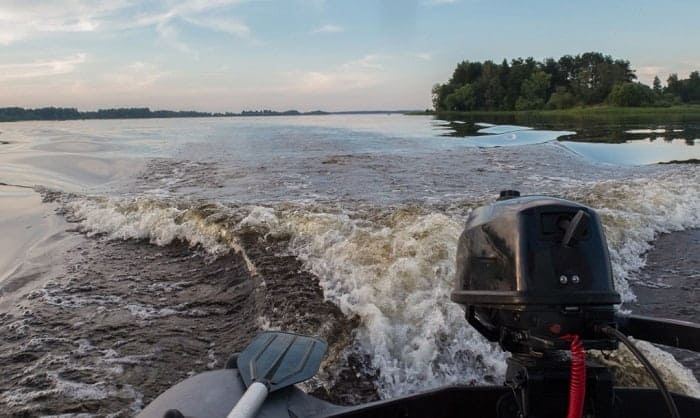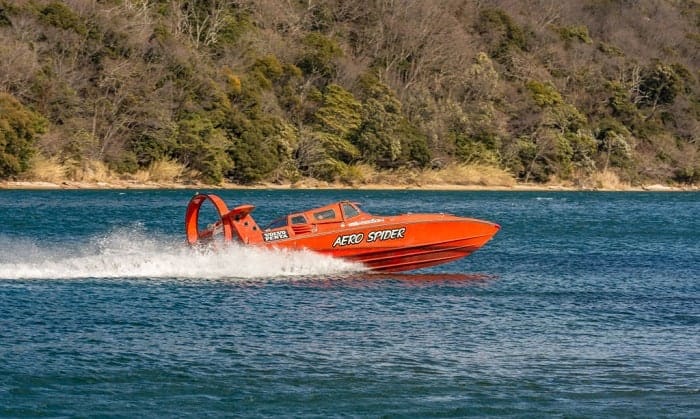Acknowledging the importance of knowing your vessel’s ability, you’re eager to get the answer to ‘Where can you find the maximum horsepower for your boat?’ You can check the capacity plate of your boat as an initial step.
This plate is on the steering area, helm, or in front of the captain. Federal law requires vessels that are over 20 feet long to have this capacity plate. It bears the maximum gross load, allowed maximum horsepower, and the number of passengers.
To learn everything about your boat’s maximum horsepower due to other factors, read this article. You need to know other things that a capacity plate can’t tell you.
Table of Contents
Details Behind The Boat’s Capacity
Definition of Horsepower
A horsepower is a unit of measurement used to determine how powerful an engine is. It applies to all engines, including the ones used in water vessels. The word ‘horse’ was derived from the past when people still worked and traveled with horses.
Due to marketing strategies, the scientist who invented the steam engine based the calculation on the amount of work one horse can render in a minute. It led to the discovery that one horse moves 33,000 pounds per single foot every minute.
To relate this to mechanical work, an explanation about the number of horses that equate the engine’s capacity was shown. Thus, horsepower has been used until now.
The Appropriate Horsepower for Your Boat
Your boat’s total weight is the basic foundation when finding the appropriate amount of horsepower. The rule of thumb dictates that there should be 25 to 50 pounds for every single horsepower. Hence, an 800-pound boat needs a 20 horsepower engine.
It is not a math class, but you can have a different method that goes the other way around. For instance, the weight of your boat is 5,000 pounds, and it has a 300-horsepower engine.
What you need to do is divide 5,000 by 300, and you’ll get 16.6 horsepower per pound of your boat’s weight. Know that the lower the number, the faster your vessel can travel.
As you can see, the speed of your boat depends on how horsepower, the boat’s weight, and size are interrelated. You may consider the idea of adding two outboard motors but you don’t have to forget the additional weight.
Outboard motors from Anbull, Cozyel, and New Tilt are great options. This method is recognized as safe and effective. However, there are other ways to determine the appropriate horsepower for your boat:
- Manufacturer Limit
The capacity limit set by the manufacturer is in the manual or capacity plate. You may find some lists that show limits for you to stay safe in the water. Somewhere in these lists, you can also find the maximum horsepower your boat can take.
Knowing the right horsepower and limitations to your boat’s capacity will guide you to get a larger or smaller motor.
- Purpose of Using the Boat
Another thing that you have to look at is what you’ll use your boat for. It’s unnecessary to have tons of horsepower when you’re only cruising with family and friends.
Those who usually need a high amount of horsepower are tubers, wakeboarders, water skiers, and other water sports enthusiasts. The need for horsepower increases when there’s additional equipment and weight.
There should be a correct level of horsepower to heave the weight of the boat and the load in it.
- Number of Passengers
Passengers are considered a contributor of weight in a vessel. As mentioned, more weight increases the required horsepower. It won’t matter if you get on your boat with a fishing buddy. But you will need extra horsepower if you go sailing with the whole family or your peers.
- Fuel Efficiency
Be careful when choosing your boat engine, as the amount of horsepower affects fuel consumption. In regards to this, it would be wise if you pick a fuel-efficient engine.
If you ever have a higher horsepower engine in your boat, it doesn’t mean that it’s less efficient. 3,000 to 3,500 RPM can also be efficient. Again, the boat’s weight and length will help you discover the right horsepower to make it work at its peak.
Avoid working on a full-throttle if you have a lower horsepower engine, as this kind of operation consumes fuel fast. You have to do calculations. Doing the math for this concern will involve the fuel consumed per hour or GPH.
You have to be aware that a gallon of gasoline weighs 6.1 pounds, and it’s 7.2 pounds for a gallon of diesel. Additionally, despite how well-maintained a four-stroke engine is, it can use up to 0.5 pounds of fuel per horsepower on an hourly basis.
When it comes to a diesel engine, the hourly consumption is 0.4 pounds of fuel. The formula is GPH = the exact fuel consumption x horsepower or specific fuel weight.
If you want to get the amount of fuel consumed by a 300-horsepower engine, the answer is 24.5 gallons per hour. The calculation is (0.50 x 300) divided by 6.1.
- Federal Requirement
Given that you have to match your boat with the right horsepower, you also need to do it for the sake of Federal requirements. It’s prohibited to empower your boat outside its limit. It is because it puts your life and those around you at risk.
This regulation from the Federal government asks boaters to show the capacity plate. Always follow the recommended capacity to get away from conflict with the law and endangering yourself and others as well.
Of course, manufacturers make it easier for you by following all the requirements set by the Federal government.
The Calculation Of Boat’s Load Capacity
There are strict guidelines when manufacturers build and design boats. The boat capacity calculator is involved in it. It includes the load that a vessel can bear and the engine’s weight which is linked to the level of horsepower.
Conveniently, you can do the calculation by yourself. You’ll need to do it if you lose the capacity plate and the manual. Well, you have the alternative to check about it online, but you can take some time and do the calculation with this formula:
- Boat’s length x boat’s width / 15 = number of passengers that a vessel can have
For example, your boat is 30 feet long and 12 feet wide. So, 30 are multiplied by 12, and when divided by 15. You’ll come up with a load capacity of 24 people. Next, you have to associate the weight of the passengers.
Let’s say the average weight for each person is 150 pounds. Multiply 24 by 150, and you get the total boat capacity which is 3,600 pounds. This calculation applies to vessels below 25 feet long.
Considerations On Insurance Policy
Knowing the maximum horsepower for your boat is also an essential thing for your vessel’s insurance. Premium cost, overall coverage, and type of policy are linked to this.
- Premium Cost
You have to abide by the rules set by your insurance regarding boat horsepower. Change in horsepower doesn’t alter anything on the premium cost. Usually, boats with high horsepower mean higher prices.
- Overall Coverage
It’s also possible that the insurance company won’t cover the horsepower that exceeds the original maximum capacity set by the boat manufacturer. You have to know its importance as it affects insurance coverage.
- Type of Policy
The type, overall size of your boat, and maximum horsepower can guide you to know what insurance policy you need. To set an example, a renter’s or homeowner’s insurance policy is typically for small power boats that work with less than 25 horsepower.
Large boats that run through 25 miles per hour HP have separate insurance policies.
Sum It Up
One can simply answer ‘capacity plate’ for the question, ‘Where can you find the maximum horsepower for your boat?’. Manufacturers may follow Federal regulations, but it won’t hurt if you do some calculations.
Don’t forget the other factors that affect the maximum horsepower of your boat. They’re the purpose of using a vessel, the number of passengers, and efficiency. The boat’s weight and other loads like the motor are also related. p

“I am James Harvey – founder of Boating Basics Online. It is established with the drive to help out first-time boaters, which are those desiring to explore their way through the water. So if you are new to boating, start from here with me. “




